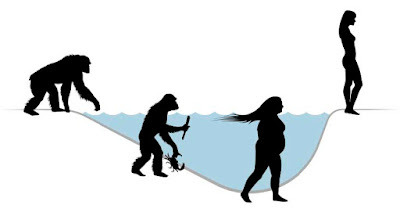What characteristics assured the success of one sapient hominid to survive and reproduce amidst a savage, predator-infested environment? Researchers are focused on ancient African river deltas searching for evidence that the earliest humans foraged for mollusks and the eggs of seabirds.
In four studies of carbon isotopes in fossilized tooth enamel from scores of human ancestors and baboons in Africa from 4 million to 10,000 years ago, researchers found a surprise increase in the consumption of grasses and sedges--plants that resemble grasses and rushes but have stems with triangular cross sections. [The National Science Foundation]These aquatic hominids were no longer reliant on knuckle-walking as the buoyancy of water enables upright wading. Usually, she waded just deep enough to hide from or repel marauding hyenas and just shallow enough to leap away from crocodilians while an infant clung to her, fingers entwined in ample head and body hair.
Shellfish-crushing molars had evolved to replace the canine teeth more prevalent in other primates (now sometimes disappearing in modern humans), because she learned to soften food, especially meat, with fire. Wading and diving into deeper water lead to the development of her voluntary breath control, a trait absent in other primates and a core requirement for the evolution of language.
Some have dubbed her Mitochondrial Eve.
Having adapted logs to aid her migration from deltas to islands to continents beyond her native Africa, Richard Dawkins says her 2.5 million year swim continues to this day.
Humans' genetic relationship to a history of riparian life runs deep.
This post has been updated: originally uploaded in March, 2010. Updated 2 January, 2014.

10 comments:
Work on this story
http://www.businessinsider.com/water-may-have-shaped-human-evolution-2014-7
Why our brains love the ocean: Science explains what draws humans to the sea
How it all began: TED radio hour, NPR.
"The percentage contribution of each food type to the diet will depend (you guessed it) on the energetic value of specific foods in specific habitats, at specific times of year. Evidence from the entirety of human evolution suggests that our ancestors, and even we as modern humans, are just as omnivorous." --Ken Sayers, posted at Raw Story.
Cooking Up Bigger Brains
"The aquatic ape theory has been disregarded by paleoanthropologists, but it deserves another chance:" Human Evolution in the Sea at Bioko.
"The available evidence then strongly suggests that erectus invented language more than a million years ago. In so doing, Homo erectus changed the world more than any creature since, including their grandchild, Homo sapiens." Did Homo erectus speak? Early hominins who sailed across oceans left indirect evidence that they might have been the first to use language
"The picks, cleavers, scrapers, and bifaces were so plentiful that a one-off accidental stranding seems unlikely, Strasser says. The tools also offered a clue to the identity of the early seafarers: The artifacts resemble Acheulean tools developed more than a million years ago by H. erectus and used until about 130,000 years ago by Neandertals as well." Neandertals, Stone Age people may have voyaged the Mediterranean
"The Georgian site at Orozmani has brought to light the oldest remains of early humans yet excavated outside Africa and offers clues to the patterns of Homo erectus, a hunter-gatherer species that scientists believe started migrating around two million years ago." Reuters
Post a Comment